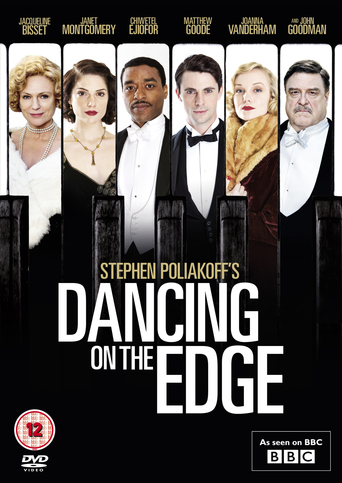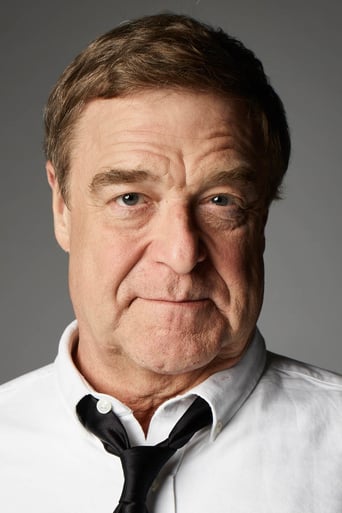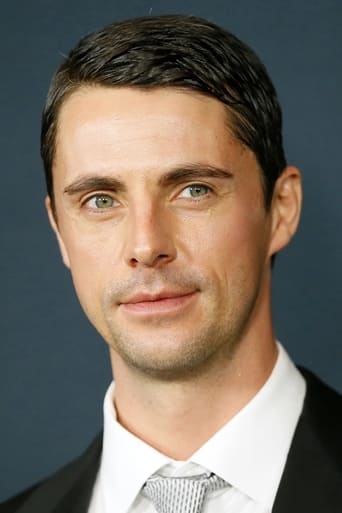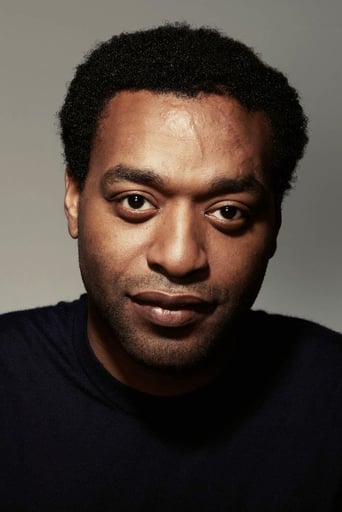

Dancing on the Edge (2013)
A black jazz band becomes entangled in the aristocratic world of 1930s London as they seek fame and fortune.
Watch Trailer
Cast
Reviews
This is a must-see and one of the best documentaries - and films - of this year.
It's the kind of movie you'll want to see a second time with someone who hasn't seen it yet, to remember what it was like to watch it for the first time.
By the time the dramatic fireworks start popping off, each one feels earned.
Through painfully honest and emotional moments, the movie becomes irresistibly relatable
For so many people not liking this, it has a high rating here on IMDb. I enjoyed it but see its flaws.I am not familiar with the work of Stephen Poliakoff, so I can't comment on the criticisms of him.The series is about a black jazz band in the 1930s who is discovered by a music journalist, Stanley Mitchell (Matthew Goode). With Wesley's help, the group is booked at the upscale Imperial Hotel and even entertain Prince George (erroneously described during the program as the Prince of Wales, who was actually Edward, Prince of Wales). The band becomes successful and is written up often by Mitchell. With two talented singers (Wunmi Mosaku and Angel Coulby), they come to the attention of a record company and radio. But tragedy strikes, and the ensuing events threaten to ruin the band.I'm at a disadvantage here because I'm not familiar with early '30s jazz music, but the critiques say the music presented is actually from a decade later.The songs are original to the production, which were also criticized. The producers certainly could have found actual songs, but I suppose they didn't want to pay for the rights. A couple of the songs weren't very good.It's an expensive production with some excellent actors: Goode, who I've always loved, Chiwetel Ejiofor as Louis Lester, the leader of the band, Anthony Head, John Goodman, Tom Hughes, and Jacqueline Bisset. Very formidable.There was also criticism that the series did not really evoke the '30s. I thought it looked wonderful, particularly the hotel scenes. But I agree, there was something missing in the period feel. Fascinating to me was the statement in the series that the Brits didn't know what Americans sounded like until the advent of talking pictures, as well as the talk of the wireless. One really does get the feeling of limited communication and how far we've come. Suspenseful, well-acted, this could have been more fascinating with some stronger writing, attention to period details, and maybe some cutting, perhaps to four episodes instead of six. The research wasn't perfect -besides the Prince of Wales ID, there was also the reference to Clark Gable. In 1933, Clark Gable was just coming onto the radar in the U.S. Ronald Colman would have been much better. The devil is in the details.
I loved this miniseries! It was very subtle and it made the viewer think. A room of people could watch the same episodes and gather different opinions about the meaning. I love British drama because it doesn't spell out everything for the audience. The Prince's proposition to Louis, the relationship with Julian and two other characters and the meaning of being on the edge. I love the expression on the main character's face when he realizes what it going on. The socio-political statements are subtle and clear as to class and race. It made me reflect on how far this world has come since then. The interracial relations and the color hue thing made me remember how it was back in the 70's and how different it is now. I also love the way color and class was discussed when money came into the picture. From sneaking through the back door to being escorted in the grand entrance. I wished it went on for another season where characters were brought back from exile and old love rekindled, but this is good enough. I think John Goodman is a compass towards good scripts and he makes any movie better. Watch it and enjoy. Being black and poor and hob knobbing with the leisurely wealthy can be dangerous for the ones on the edge of a society where color is still an issue. Being given privilege and then having it taken away can bring you back down to earth so you can see things clearly. Being poor and not having any nobility can also take you to a place where you feel you may transcend your status but like a young blue jay with it's wings clipped, you fall to the ground.
Prepare yourself for six hours of bad writing, bad acting, and really, really bad music.Writer-director Stephen Poliakoff has become the M. Night Shyamalan of British TV drama. He started strong, with dramas that seemed to be new and different and even (hideous new modifier!) award-worthy. Then, with each new project, his threadbare bag of tricks became more familiar and predictable; what once seemed endearingly offbeat became simply irritating, and Poliakoff's narrative deceits became increasingly obvious, no longer distracting us from his inability to create living characters or coherent plots.The downward spiral has led to this sloppy, boring mess of a mini-series. Good luck getting through the whole thing, and if you do, you will almost certainly be disappointed by the limp ending.Particularly irritating is the music. Poliakoff presumes to resurrect a largely forgotten era of British entertainment, but the newly-written songs on offer here do not capture the spirit of the originals. Not only are they displeasing to the ear and badly sung, but the viewer is forced to hear them over and over and over.It is hard to see how Poliakoff's next project can be worse than this, but if the trajectory holds, he will find a way to make it so.
Exactly five out of ten. Lots for fabulous staging and sumptuous settings, from the Duchesses' own immaculate toy working class village, through the decaying stone and lime plaster of Wilton's Music Hall, past the glittering Deco ballrooms to the antechambers of the minor fascist royals and their fawning courtiers, to the perfection of Angel and Louis' stage costumes. Only the new London suburb let it down, because it had to look new, and it didn't.None for the Jazz/swing thing, although at least it protected the BBC from its achilles heel of selecting the wrong music altogether.Few (or is that less?) for the accents. Only Anthony Head nails it, with Jacqueline Bisset just behind. The others, the youngsters, must understand that speaking old fashioned posh English is our specialist subject. The would-be upper class actors should go and lock themselves away with tapes of the old Prince of Wales and the young Queen until they never slip into the strangled and dipthonated Estuarian that escaped at so many unfortunate moments that would each have cost them any reputation in refined society at that time.Picky? Maybe to some, but these are the criteria this SIX HOURS of drama demands to be measured by. After all, what else does it offer? A low-grade murder mystery with a thoroughly low-grade plot. Think: since Louis knows he didn't do it he must realise who did, so why would he let a savage and dangerous knife attacker just hang around his band? And those who believe him must also follow the same line. A little plot development could have saved this storyline from itself: not confronting the person who did it should become a true tragedy: his own inaction the failure that leads to his being framed. But that's not the story here.Zero suspense. If we suspend disbelief on the above, why is there no tension drawn out of the presence of this threat in the midst of our odd little group of fellow jazz travellers?Minimal characterisation. Some of the cast get enough detail to demonstrate humanity, perhaps most notably Janet Montgomery's conflicted and tragic white immigrant Sarah, and John Goodman's plutocrat with a soft-touch Masterson, but the rest are just comic-book paste-ups, except for the black men who are, apart from Louis and the angry manager in episode 1, entirely absent verbally and visually. Apparently they are real musicians.Incredible characterisation. Could anyone get to be a zillionaire Wall Street Crash capitaliser by behaving like Masterson? You buy a going concern, invest in it heavily, hire all your new pals, and on day 1 they all turn up to work late, hang around demonstrating no dynamism and don't focus on your enterprise. That's not Conrad Black over there, even if his most beloved pet project is under even more threat.And does anyone get to be a murderous psychopath because their parents were cold and stiff upper class fascists, which seems to be Poliakoff's stated thesis? If they do it needs more substance to make it credible.So why as many as five stars out of ten? Well mostly because my partner is black and doesn't take to all the white nonsense at the BBC too kindly unless it is staging fine architecture, but did stay the distance with this and pronounced it Very Good.We both thought Chiwetel Ejiofor's Louis painted a solecistic picture of great presence, that demonstrated a heroic dignity whilst working out whom to trust, eschewed most of the patronising pitfalls Poliakoff had laid down, and does, despite the writing, allow us to see the world through his - Louis' - eyes.The broad image of the 30's was engaging, although it would have been good to better draw out the upper class xenophobia/xenophilia contradiction. The Prince of Wales can dance with the showgirl in private, but what else follows? This is surely the central question. You start with the idea that certain families are born to rule, that all white families are born to dominion over all black ones, then create a social mix. Some find themselves forced to stay loyal to their clan despite love, and some betray their caste because of passion for the logic of justice. Poliakoff's way is not soliloquy or wordiness, and that is to the good, but does he really lay down enough for us to live the feeling of time, or to see how fatal are its flaws? I don't think so. In the end it is the crafty white boy, Matthew Goode's Stanley, who offers us the only suggestion of hope of future opportunity and enlightenment.Given John Goodman and Mel (Muck and Brass) Smith to work with, to name but two, something much more powerful than this was possible. Would it be unkind to suggest that this production demonstrates that British drama in general, and the BBC in particular, places too much emphasis on the individual genius of the writer/director and too little on the team? You imagine a modern classy US production of this would find it distinctly underwritten, busy itself with building much more detail onto this succulent framework, especially of ambivalence, plot and character and in passing, without much effort, find work for black actors beyond standing behind trombones. That doesn't require an HBO budget, just more attention to detail in the thinking of the writing and production.If we build that way, we can find a proper role for BBC drama that will survive the rust on the Crittals and the breakage of cut glass accent production at RADA.


